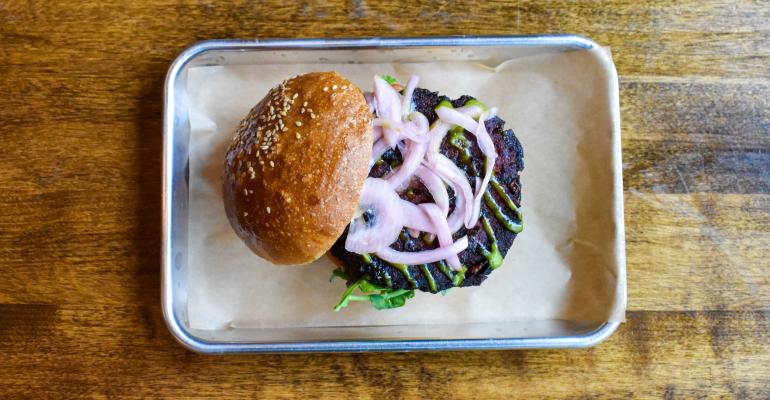Veggie burgers, often uninspiring menu items made from pre-made meat analogs, or old-school pre-made patties, are now getting more attention, and loads of flavor, from restaurant operators.
"Generally speaking, house-made from local ingredients is our kitchen philosophy, and personally speaking, if you are going to order and eat something called a veggie burger, then it should taste like vegetables," said chef Steven Kowaleski of Revolution Brewing in Chicago, adding that his version stands out for its flavor as well as its hue. "Highlighting the vegetables and making sure they are the focus is what sets this purple patty apart from the rest."
The color of Kowaleski's $12 burger comes from roasted beets, which get blended and studded throughout the patty, also giving it an earthy flavor profile. There are also local cremini mushrooms, providing texture and umami, as well as tomatoes, celery, carrots, onions, and jalapeño peppers.
That’s a far cry from the traditional veggie-burger patty, which for decades had been a frozen disk of ingredients such as the carrots, onions, soy protein, mushrooms, water chestnuts, soy flour, and wheat gluten that Morningstar Farms entered the market with in 1975.
Others followed suit, such as Garden Burger in 1992 and Boca Burger in 1993.
Then a new generation of meat analogs emerged, starting in 2016 when Stanford neuroscientist Patrick Brown launched the Impossible burger, giving diners a meaty patty made entirely of plant products. Marketing touted it as the most meat-looking veggie burger on the market thanks to science and a heme-related molecule known as leghemoglobin, which is manufactured by a genetically engineered yeast.
Many customers tried the new Impossible Burger and similar items, such as those from Beyond Meat, but now chefs like Kowaleski are developing meatless burgers that fit their own philosophies and also satisfy diners’ increasing desire to eat minimally processed food.
At Stephanie Morgan’s Seabirds Kitchen, which started as a food truck and now sports three California locations, the popular Beets Me Burger features a patty of shiitake mushrooms, beets and chia seeds topped with almond butter, grilled onions, arugula, dill pickles, and herb mayonnaise for $19. Chef Tory Miller of Graze in Madison, Wis., creates a bright magenta vegan patty featuring beets and walnuts to create a hearty burger for $!4.
At four-unit Lil Woody's in Seattle, a house-made black bean burger is served for those looking for a meat-free option at a price of $9.50. Burgerlords, with three locations in the Los Angeles area, showcases a signature veggie burger made savory with barley, nuts, and panko breadcrumbs for $9.99. Colorado-based Park Burger, which also has four locations, offers a chef-driven veggie patty made with brown rice, barley, black beans, corn, a variety of vegetables, and its own special seasonings for $7.25, and Beatnic in New York City has a classic vegan patty made with black beans, mushrooms and brown rice for $9.95.
At Next Level Burger, a vegan chain launched in 2014 in Oregon that now has nine locations in Washington, California, Colorado, Texas, and New York, creating a signature patty was important to the brand. In fact, co-founder Cierra de Gruyter created the patty at home, in her own kitchen.
"My goal was to create something proprietary with the ideal balance of taste, texture, and nutrition for our guests," said de Gruyter over email. "It took me months of trial and error to develop, but now the recipe has been a menu staple for almost a decade."
That quarter-pound burger sells for $9.95 and is made with organic vegetables and other non-GMO ingredients including mushrooms, carrots, onions, chia seeds, and quinoa. Sporting 19-grams of protein, the burger also can be topped with avocado, cheese, and vegan roasted garlic-thyme mayonnaise. Next Level Burger also offers burgers made with Beyond Meat, starting at $10.95.
In 2016 the vegan comfort food spot Meta Burger launched in Denver, founded by Matthew Coates and Michael Reeves. Here the proprietary Meta Patty is made from a seasoned, non-GMO soy base, and each patty gets hand-formed in-house every morning. Each patty has roughly 20 grams of protein and fewr than 10-grams of fat, lower than Beyond or Impossible patties, which weigh in around 20-grams of fat. Burgers run around $13.50, and come with vegan sauces also made at Meta Burger. So far three locations in Colorado have opened, but the plan is for the company to expand the concept in the coming year.
The house-made burger train isn’t limited to small concepts.
In May, Shake Shack, with more than 290 locations in the United States, launched its own take on the veggie burger. Starting at $8.29, the Veggie Shack comes packed with mushrooms, sweet potatoes, carrots, farro, and quinoa, and is topped with American cheese, fried onions, pickles, and Shack Sauce. According to a spokesperson, the company spent five years developing the new menu item.
Now with a fresh wave of chef-driven dedication, the humble veggie burger has been offered n second, tastier life.





